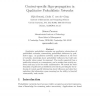Free Online Productivity Tools
i2Speak
i2Symbol
i2OCR
iTex2Img
iWeb2Print
iWeb2Shot
i2Type
iPdf2Split
iPdf2Merge
i2Bopomofo
i2Arabic
i2Style
i2Image
i2PDF
iLatex2Rtf
Sci2ools
116
click to vote
IJCAI
2001
2001
Context-specific Sign-propagation in Qualitative Probabilistic Networks
ive probabilistic networks are qualitative abstractions of probabilistic networks, summarising probabilistic influences by qualitative signs. As qualitative networks model influences at the level of variables, knowledge about probabilistic influences that hold only for specific values cannot be expressed. The results computed from a qualitative network, as a consequence, can be weaker than strictly necessary and may in fact be rather uninformative. We extend the basic formalism of qualitative probabilistic networks by providing for the inclusion of context-specific information about influences and show that exploiting this information upon reasoning has the ability to forestall unnecessarily weak results.
| Added | 31 Oct 2010 |
| Updated | 31 Oct 2010 |
| Type | Conference |
| Year | 2001 |
| Where | IJCAI |
| Authors | Silja Renooij, Simon Parsons, Linda C. van der Gaag |
Comments (0)

